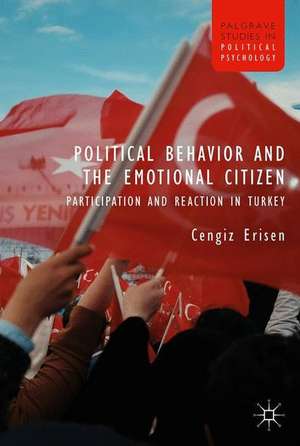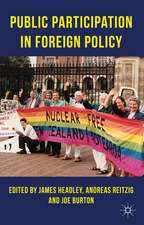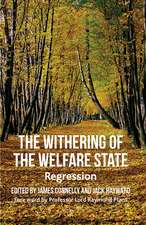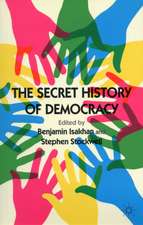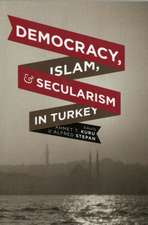Political Behavior and the Emotional Citizen: Participation and Reaction in Turkey: Palgrave Studies in Political Psychology
Autor Cengiz Erisenen Limba Engleză Hardback – 21 dec 2017
| Toate formatele și edițiile | Preț | Express |
|---|---|---|
| Paperback (1) | 579.67 lei 6-8 săpt. | |
| Palgrave Macmillan UK – 30 aug 2018 | 579.67 lei 6-8 săpt. | |
| Hardback (1) | 727.80 lei 6-8 săpt. | |
| Palgrave Macmillan UK – 21 dec 2017 | 727.80 lei 6-8 săpt. |
Preț: 727.80 lei
Preț vechi: 887.55 lei
-18% Nou
Puncte Express: 1092
Preț estimativ în valută:
139.26€ • 145.12$ • 115.31£
139.26€ • 145.12$ • 115.31£
Carte tipărită la comandă
Livrare economică 03-17 aprilie
Preluare comenzi: 021 569.72.76
Specificații
ISBN-13: 9781137587046
ISBN-10: 1137587040
Pagini: 256
Ilustrații: XVI, 231 p. 7 illus., 1 illus. in color.
Dimensiuni: 148 x 210 mm
Greutate: 0.45 kg
Ediția:1st ed. 2018
Editura: Palgrave Macmillan UK
Colecția Palgrave Macmillan
Seria Palgrave Studies in Political Psychology
Locul publicării:London, United Kingdom
ISBN-10: 1137587040
Pagini: 256
Ilustrații: XVI, 231 p. 7 illus., 1 illus. in color.
Dimensiuni: 148 x 210 mm
Greutate: 0.45 kg
Ediția:1st ed. 2018
Editura: Palgrave Macmillan UK
Colecția Palgrave Macmillan
Seria Palgrave Studies in Political Psychology
Locul publicării:London, United Kingdom
Cuprins
Introduction.- Chapter 1: The History of Turkish Political Behaviour.- Chapter 2: Conceptualization and Measurement of Emotion.- Chapter 3: Emotions and Political Attitudes.- Chapter 4: Emotion and Political Involvement and Participation.- Chapter 5: Emotion and Political Ads in Turkey.- Chapter 6: Emotion and Voting Behaviour.- Conclusion.
Notă biografică
Cengiz Erisen is Research Associate in the Center on Democratic Performance at Binghamton University, USA, and Associate Professor in the Department of Political Science and International Relations at Yeditepe University, Turkey. He is a recipient of two prestigious awards for young scholars in Turkey. His research interests include political psychology, comparative political behaviour, and public opinion analysis across diverse contexts. His work has appeared in numerous journals, including Political Psychology, European Union Politics, Journal of Common Market Studies, American Politics Research, Political Research Quarterly, and Turkish Studies. He has also co-edited a book on democracy in Turkey and guest edited journal special issues on political psychology.
Textul de pe ultima copertă
This book studies the role of emotions, such as anger, anxiety, and enthusiasm, across various domains of political behavior in Turkey. The author considers how emotions affect evaluations of leadership performance, levels of intolerance, likelihood of following and participating in politics, perceived threats from terrorism, and electoral decisions, including vote choice. Using a nationally representative survey and experimental data, this study empirically analyses the causal associations among the primary factors explaining the Turkish electorate’s political attitudes and behaviours. The book will be of particular interest to academics, university students, and policymakers seeking to learn more about contemporary Turkish politics amid the recent political and social turmoil that has affected all parts of this society.
Caracteristici
Provides the first book length study of the role of emotions on Turkish political behaviour Offers a comparative application of emotions research Uses empirical data to discuss Turkey's political attitudes and the international implications of the findings
